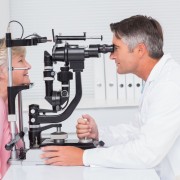Eye test can detect early-stage Alzheimer’s
Researchers use new screening test to positively identify Alzheimer’s patients

Doctors may one day be able to use a simple eye test to detect the onset of Alzheimer’s disease, researchers say.
Researchers in Australia used two separate techniques to identify a key Alzheimer’s trait in the retina and lens of the eye, allowing them to separate probable Alzheimer’s patients and healthy volunteers with a high level of accuracy, the Telegraph reported.
In preliminary trials conducted by the Australia-based Commonwealth Scientific and Industrial Research Organisation (CSIRO), researchers asked 200 volunteers to take a supplement of curcumin, an ingredient found in turmeric spice. Curcumin binds strongly to beta-amyloid proteins, which form clumps in the brain in Alzheimer’s Disease patients, and are a key indicator of the disease. When the curcumin binds to beta-amyloids, doctors can detect the proteins in the subject’s retina using an imaging device.
Preliminary results based on 40 participants showed that the test correctly identified 100 percent of patients with Alzheimer’s and 80 percent of those who did not have the disease. Researchers say the new method could be applied as an initial screening that could accompany a patient’s regular eye exam.
If the eye test gives a positive result, doctors could follow up with a PET (positron emission topography) scan of the brain or spinal fluid analysis to confirm the presence of Alzheimer’s disease, researchers said.
“We envision this technology potentially as an initial screen that could complement what is currently used: brain PET imaging, MRI imaging, and clinical tests,” Shaun Frost of CSIRO said. “If further research shows that our initial findings are correct, it could potentially be delivered as part of an individual's regular eye check-up.”
Further links:
Csiro.au
Telegraph.co.uk
Related Articles
Some basic facts about dementia you should know
GHT asked the medical director of the UCLA Alzheimer's and Dementia Care Program to shine some light on the debilitating condition plaguing modern societies
Read moreLower cholesterol can reduce Alzheimer’s risk
Neurologists find link between cholesterol levels and Alzheimer’s disease risk
Read moreLatest Articles
Medical Care
Clinical Exercise Physiologist (CEP): The Emerging of Exercise is Medicine
How Exercising can be a Medicine
Read moreMedical Care
Reversing type 2 Diabetes: Embracing Hope and Determination
Experience the remarkable journey of Ash and his grandfather Atok as they conquer type 2 diabetes through unconventional methods, showcasing the power of love and determination over adversity.
Read moreMedical Care
Bladder Cancer: What You Need to Know
Empower yourself with our comprehensive guide to bladder cancer. Explore symptoms, diagnosis, treatments, and supportive resources to safeguard your health.
Read more